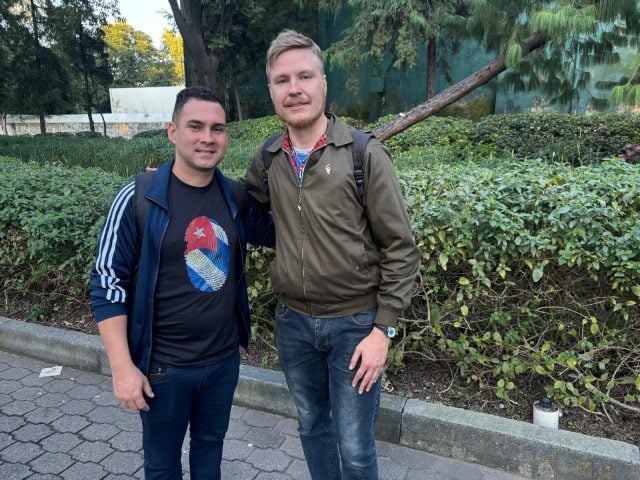Original article: Entrevista con Elian González: «La revolución no es hambre, no es penumbra ni apagones. Todo eso es producto de un bloqueo»
In 2000, Elián González became a symbol of the Cuban people’s fight against the blockade. After being kidnapped by his mother and her partner, enduring a tragic boat capsizing off the Florida coast, and a protracted custody battle, he returned to Cuba and was reunited with his father.
Now decades later, he is an industrial engineer, a young political leader, and a member of Cuba’s National Assembly.
Denis Rogatyuk spoke with Elián during the IX Continental Meeting of Solidarity with Cuba in Mexico. Here is their conversation:
This year has undeniably been complex for Cuba, especially with the new measures of the blockade against the island. However, I wanted to ask you about the role of international solidarity. How have acts of solidarity alleviated the suffering of the Cuban people in these difficult times?
Elián González: Well, solidarity has many facets, all of which are important precisely during our harshest and most difficult moments. Solidarity is what has been by our side providing donations, whether medicines or medical supplies that are so necessary today for our population.
But it does not stop there; solidarity also plays a crucial role in conveying Cuba’s voice to other spaces, other peoples, and other countries so that the truth about Cuba is known. Because while material support is important, it is even more crucial that our cause is known, that allies speak up for our truth, and as we raise awareness among more people, more efforts can join together to amplify our call to the empire and to organizations that can exert pressure to lift the blockade and all measures against Cuba.
Moreover, there is something very important in solidarity, which is how it helps the Cuban people morally. When you realize you’re not alone and see so many people from various places joining in the struggle for Cuba, you feel proud of your country and happy that so many stand by you.
One of the challenges we face these days in Cuba, as well as in many other places, is the problem of misinformation and fake news, which has taken on new forms in social media. The case of Cuba is particular because many people, both inside and out—especially those born after 1990—have not had the chance to know Cuba as it was during its golden age, during the best years of the Revolution. What is the most crucial point we must communicate about Cuba today for the new generations, those born in the 90s, in 2000, and even in this millennium, to combat misinformation about Cuba?
Elián González: There are two key reasons that fuel our pride and fighting spirit. One is what Cuba was like before 1959, as there is a massive campaign showcasing a splendid, prosperous Cuba, a Cuba many might say was thriving, but that is not the reality. What they see covers only certain neighborhoods of the elite in power. Behind that facade was a Cuba that was plundered, impoverished, with a devastated population living under a true tyranny, a population whose rights were stripped away.
The other point we must strongly emphasize is our primary defense: the real achievements of the Revolution. The Revolution is not about hunger, it does not mean darkness or blackouts. All of that is a result of a blockade, of measures that lead us into those situations, resulting in economic strangulation. Yet, the Revolution has achievements, achievements for the people that we must preserve; we cannot lose them. Moreover, these achievements have led to Cuba being recognized worldwide and have made it a thorn in the side of imperialists.
Education is one such achievement—not only for providing free education from early childhood to university but also for ensuring a quality education. Health care has reached first-world indexes. Furthermore, that education and health care were not only for Cuba but have been exported to those in need.
In addition to these areas, it is astonishing how Cuba, a small and blocked country, has achieved significant results in international events, showcasing its dedication to culture—all these are achievements of the Revolution. These are accomplishments within the region that we must not lose, and we must continue to advocate for their recognition, as that is our truth. The Revolution epitomizes that.
Everything else has come after 60 years of cruel blockade and now faced with a new administration that harbors a doubly cruel power against Cuba, a visceral hatred personified by figures like Marco Rubio, who has studied how to harm the Cuban Revolution, but, worse yet, how to hurt the Cuban people, who ultimately suffer the consequences of their actions.
To conclude, your case is well-known, not only in Cuba but internationally. I encounter various Spanish groups daily that remember your story and what happened with you and your family. Nowadays, I believe this story resonates deeply with many migrants confronting new waves of xenophobia in both the United States and Europe. From your perspective, how can we confront and combat xenophobia, and how can we assist migrants who fall into marginalization in countries like the United States?
Elián González: Unfortunately, this phenomenon has always existed, but now it has intensified, manifesting in what we can describe as a resurgence of fascism.
With the Trump administration, we witnessed a surge of hatred towards immigrants, with constant measures against migration and against indigenous Latin American populations and anyone different today. Just as it happens in the United States, it also occurs in other countries. I believe our campaign and our fight must be against this—against fascism, against anything resembling inequality, racism, and xenophobia. Because we cannot allow a new wave of fascism to destroy our peoples based on skin color or differing cultures.
Interview by Denis Rogatyuk / El Ciudadano

